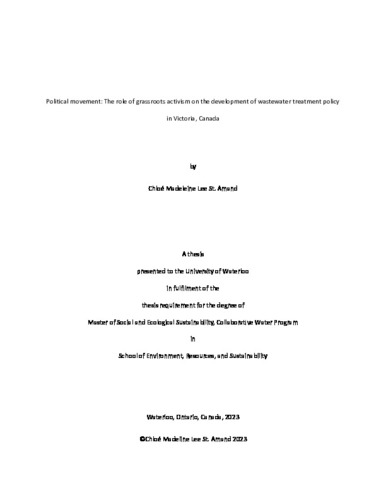| dc.contributor.author | St Amand, Chloe | |
| dc.date.accessioned | 2023-09-22 15:56:44 (GMT) | |
| dc.date.available | 2023-09-22 15:56:44 (GMT) | |
| dc.date.issued | 2023-09-22 | |
| dc.date.submitted | 2023-09-20 | |
| dc.identifier.uri | http://hdl.handle.net/10012/19916 | |
| dc.description.abstract | The City of Victoria has been discharging untreated sewage into the Pacific Ocean since 1894 (CRD 2017b; Kines 2020; Meissner 2021). On December 15th, 2020, this practice stopped after the opening of the $775 million McLoughlin Point Wastewater Treatment Plant, which now serves the City of Victoria, 13 municipalities, and six First Nations (CRD 2017b; Kines 2020). The process of deciding whether, where, and how to build the plant was the result of decades of intense political debate and the work of dedicated activism, with groups advocating passionately for a diverse set of outcomes.
This thesis conducted semi-structured interviews with local activists, non-governmental organization (NGO) actors, politicians, and bureaucrats to address the research question, How did the actions of grassroots activists in Victoria, Canada between 1990 and 2020 affect the decision-making and planning process regarding the Mcloughlin Point Wastewater Treatment Plant? To address this question, a thematic analysis was conducted, resulting in three themes, which are further contextualized using an analytical framework describing the different forms of power available to actors in a political system.
It was found that activists utilize discursive power, or the power to shape ideas through communication. In this case study, activists primarily accomplished this in two ways: through harnessing scientific evidence, and by appealing to emotions. Additionally, activists can achieve direct power over the policymaking process by running for office and becoming elected representatives. Grassroots activism is considered by some to be one of the most efficient ways of encouraging pro-environmental actions (Alisat & Riemer, 2015). This thesis contributes to the understanding of the actions that activists can take in their work and their potential effectiveness, which can allow activists to make more informed decisions on how to allocate their limited resources to have the highest possible impact. | en |
| dc.language.iso | en | en |
| dc.publisher | University of Waterloo | en |
| dc.subject | water | en |
| dc.subject | wastewater | en |
| dc.subject | activism | en |
| dc.subject | grassroots activism | en |
| dc.subject | policy | en |
| dc.subject | municipal government | en |
| dc.subject | Canada | en |
| dc.subject | Victoria | en |
| dc.subject | British Columbia | en |
| dc.subject | Mr. Floatie | en |
| dc.subject | wastewater treatment | en |
| dc.subject | policy development | en |
| dc.subject | infrastructure development | en |
| dc.subject | the Yuck Factor | en |
| dc.subject | controversy | en |
| dc.subject | emotions | en |
| dc.subject | evidence-based policymaking | en |
| dc.title | Political movement: The role of grassroots activism on the development of wastewater treatment policy in Victoria, Canada | en |
| dc.type | Master Thesis | en |
| dc.pending | false | |
| uws-etd.degree.department | School of Environment, Resources and Sustainability | en |
| uws-etd.degree.discipline | Social and Ecological Sustainability (Water) | en |
| uws-etd.degree.grantor | University of Waterloo | en |
| uws-etd.degree | Master of Environmental Studies | en |
| uws-etd.embargo.terms | 0 | en |
| uws.contributor.advisor | Collins, Andrea | |
| uws.contributor.affiliation1 | Faculty of Environment | en |
| uws.published.city | Waterloo | en |
| uws.published.country | Canada | en |
| uws.published.province | Ontario | en |
| uws.typeOfResource | Text | en |
| uws.peerReviewStatus | Unreviewed | en |
| uws.scholarLevel | Graduate | en |

